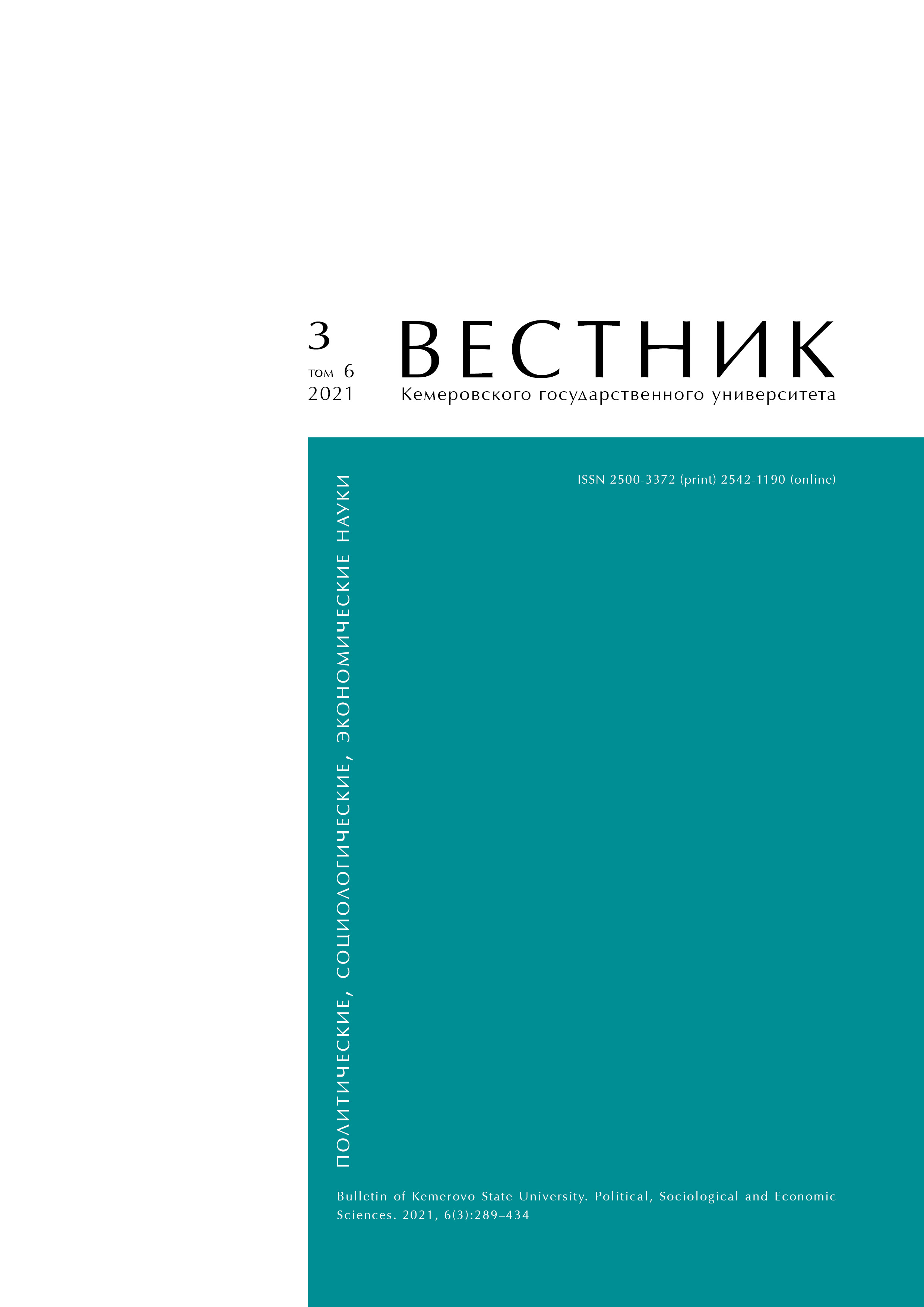Kemerovo, Russian Federation
UDC 33
The research featured the transformations of formal and informal institutions and their effect on the quality of labor force and workforce productivity. Such trends in institutional transformation as digitalization, government regulation, and environmentalization are known to affect labor market, labor legislation, education, and public administration. The research objective was to identify the main trends in institutional transformation and assess their impact on the quality of the labor force. The methods included a content analysis of documents, an analysis of statistical data, and a regression analysis. The article introduces an extended review of scientific publications, a description of trends in institutional transformation from the standpoint of labor productivity, and a forecast of workforce productivity as affected by the abovementioned institutional changes. The research results can help to plan strategies for personnel development on the business, industrial, regional, and state scale. If strategizing of labor resources is based on relevant global and national trends, it can increase company’s performance, ensure economic growth in the region, and improve the living standards of local population.
digitalization, government regulation, environmentalization, labor market, labor legislation, education, public administration, green jobs, institutions
1. Abroskin P. N. The relationship between the cost of labor and the efficiency of their use in transport. Russian Journal of Resources, Conservation and Recycling, 2019, 6(1). Available at: https://resources.today/PDF/08ECOR119.pdf (accessed 14 Jun 2021). (In Russ.) https://doi.org/10.15862/08ECOR119
2. Yasinskiy D. Yu. The concept of "quality of workforce". European Social Science Journal, 2017, (12-1): 106-116. (In Russ.)
3. Mikhnenko P. A. From Strategy-2020 to national projects: transforming the institutional model of socio-economic development. Problems of management theory and practice, 2020, (2): 6-23. (In Russ.)
4. North D. C. Institutions, institutional change and economic performance. Moscow: Fond ekonomicheskoi knigi "Nachala", 1997, 180. (In Russ.)
5. Kuzmina A. G., Kot V. V. Digitization as a determinant of the transformation of the institutional structure of the labor market. Territoriia nauki, 2019, (3): 41-47. (In Russ.)
6. Tsetsiarynets T. A. Investments into the human capital as a factor of innovative economy formation. Ekonomìčnij vìsnik unìversitetu, 2019, (41): 75-82. (In Russ.) https://doi.org/10.31470/2306-546X-2019-41-75-82
7. Nikitina E. N. Climate change in the Arctic: adaptation to new challenges. Outlines of Global Transformations: Politics, Economics, Law, 2019, 12(5): 177-200. (In Russ.) https://doi.org/10.23932/2542-0240-2019-12-5-177-200
8. Berendeeva A. B. New social and economic concepts of the assessment of transformations of Russian society and economy. Teoreticheskaia ekonomika, 2019, (3): 12-28. (In Russ.)
9. Institutional transformation of socio-economic systems in the context of digitalization: state, trends, problems, and prospects, ed. Vertakova Yu. V. Kursk: Universitetskaia kniga, 2020, 294. (In Russ.)
10. Sannikova T. D. Institutional and resource constraints on the way to solving the problem of transition to a digital economy. Russian Journal of Innovation Economics, 2019, 9(3): 633-646. (In Russ.) https://doi.org/10.18334/vinec.9.3.41059
11. Likhtin A. A. Transformation of public administration in the digital era. Administrative consulting, 2021, (4): 18-26. (In Russ.) https://doi.org/10.22394/1726-1139-2021-4-18-26
12. Belikova I. P. Management of innovative development in the regional economic system: a project approach. Stavropol: Sekvoiia, 2019, 213. (In Russ.)
13. Vertakova Yu. V., Evchenko A. V., Shcherbakov D. B. Green economy and sustainable development: towards "ecologization" state socio-economic policy in the context of institutional transformation. Izvestiya Yugo-Zapadnogo gosudarstvennogo universiteta. Seriya: Ekonomika. Sotsiologiya. Menedzhment, 2020, 10(5): 24-36. (In Russ.)
14. Sheludko E. I. Modernizational instruments of institutional support of industry ecologization. Ekonomìčnij vìsnik unìversitetu, 2019, (42): 136-149. (In Ukr.) https://doi.org/10.31470/2306-546X-2019-42-136-149
15. Legai A. V., Merkeutsyanu T. A., Makarova O. E. Education and the labor market in the context of digitalization. Digital Economy and Finance: Proc. III Intern. Sci.-Prac. Conf., St. Petersburg, 19-20 Mar 2020. St. Petersburg: TsNIT Asterion, 2020, 68-72. (In Russ.)
16. Kashepov A. V. Is digitalization of economy dangerous for labor market? Aktualnye problemy gumanitarnykh i estestvennykh nauk, 2020, (2): 58-65. (In Russ.)
17. Frolov A. S. The impact of greening the economy on employment. Teoreticheskaia ekonomika, 2020, (11): 99-106. (In Russ.)
18. Sukhorukova S. M., Pogorely A. M. Environmentalization and cosmization of economic education for "digital" class. Economics and Innovation Management, 2021, (1): 20-28. (In Russ.) https://doi.org/10.26730/2587-5574-2021-1-20-28
19. Tsverianashvili I. A. Greening education in Sweden in the 1980s-2000s. Zhurnal pedagogicheskikh issledovanii, 2020, 5(4): 19-22. (In Russ.)
20. Kurbatova S. M. Ecologization of education: essential aspects. Vestnik Vostochno-Sibirskoi otkrytoi akademii, 2020, (36). Available at: vsoa.esrae.ru/211-1205 (accessed 14 Jun 2021). (In Russ.)
21. Uskova T. V., Kopytova E. D. Ecologization of modern Russian economy: problems and ways to solve them. Vestnik Permskogo universiteta. Seria Ekonomika, 2018, 13(1): 37-57. (In Russ.) https://doi.org/10.17072/1994-9960-2018-1-37-57

















